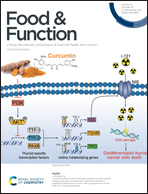Effect of heat treatment on the digestion behavior of pea and rice protein dispersions and their blends, studied using the semi-dynamic INFOGEST digestion method†
Abstract
In the present study, the structuring and breakdown of a 5% protein dispersion prepared with commercial fractions of pea and rice isolates (PPI and RPI, respectively) were monitored by in vitro digestion. These proteins were blended in a 2 : 1 ratio of pea and rice, respectively, as this would deliver a high amino acid score. The effect of heating at 90 °C for 15 min on the digestion behavior was evaluated not only for the blend, but also for the respective protein isolate fractions, using the INFOGEST international consensus, semi-dynamic in vitro gastric model. Digesta were characterized by gel electrophoresis, light scattering, confocal laser scanning microscopy and size exclusion HPLC. Heating increased the solubility of PPI from 15.7% to 26.6% at pH 7.4. RPI showed low solubility (a maximum of 2.6% at pH 2), regardless of the treatment. Confocal microscopy observations evidenced major differences in the aggregates formed during digestion, with larger aggregates for heated PPI. While the unheated pea protein dispersions precipitated near the isoelectric pH, the heated counterpart formed macro-aggregates under the same conditions. In the case of RPI, there were no differences in structuring behaviour between unheated and heat treated reconstituted powder, due to their low solubility. Rice prolamins showed resistance to hydrolysis by pepsin and pancreatic enzymes. In the heated blend, macro-aggregates formed, but with a smaller size compared to heated pea protein alone, suggesting that pea protein aggregation was hindered by the presence of rice proteins. These results demonstrate how the composition of protein isolates can affect their in vitro digestion. However, pre-treatment of plant protein blends, such as heating, can modulate the rate and mechanism of digestion.



 Please wait while we load your content...
Please wait while we load your content...